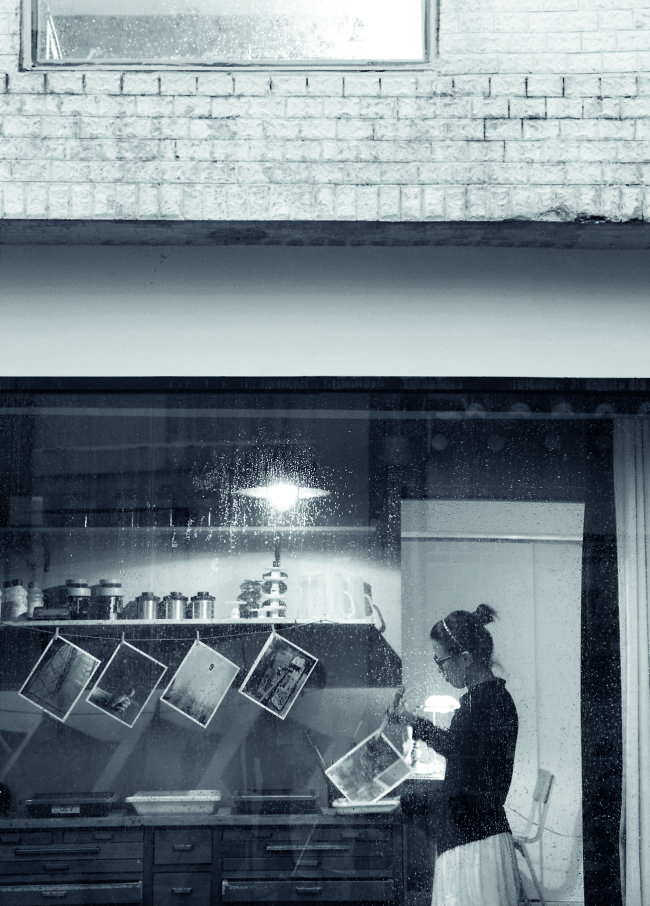[Weekender] A rebellion against perfection
Koreans embrace analog tools to seek self-expression, nostalgia and humanistic imperfection
By Korea HeraldPublished : April 17, 2015 - 19:22
In recent years, Korea, one of the most digitalized countries in the world, has seen an increasing number of people pursue “analog” ways of life, such as keeping a handwritten diary or reading a printed book.
All of this is being done in a search for self-expression ― and an element of imperfection.
All of this is being done in a search for self-expression ― and an element of imperfection.

“Koreans are seeking analog as a rebellion against perfection and an escape from rationality that human beings have firmly believed in,” said Seol Dong-hoon, a sociology professor at Chonbuk National University.
In today’s digital age, technology and social media bring people closer, but Seol said this will also continue to make them feel more isolated “because a digitally dominated society lacks a human touch.”
At a glance, there seems to be no room in Korean society for analog ― a term often used to describe anything old or reminiscent of bygone times. Yet there are signs of a growing trend of adopting old-school ideals in Korea, heralding a resurgence of analog habits.
Yang Yoon, psychology professor at Ewha Womans University, says behind this revival of old-school products is Koreans’ thirst for self-reflection.
“The digital era has brought changes too rapidly,” Yang said. “While living a life of convenience, they struggle to adapt to the changes, get lost and start questioning who they really are.”
This is evident in an apparent addiction to digital perfection. With the introduction of digital cameras, Koreans began taking large numbers of photos, editing and deleting them until all-but perfect images were left.
In a backlash against this apparent need for perfection, Kim Hyun-sik, a photographer and former journalist, opened a black-and-white photo studio, “Mulnamoo,” in Seoul in 2010.
“A digital photo can be easily edited and manipulated to look perfect,” Kim said. “But that’s not real.”
To take a picture with a film camera, there are numerous aspects to consider ― lighting, the temperature, and ambience, just to name a few.
“That’s why analog pictures are more natural, though not perfect,” Kim said. “It makes every image count. And the image you capture at that very moment can never be the same as others.”
His photo studio has been successful, with an increase customers in recent years, perhaps hinting at a sense of nostalgia that is beginning to appeal to many Koreans.
While some tap into the old days of film photography, others, like Park Sung-jun, a university student, prefers to put pen to paper.
“In modern society, everything happens so fast, so I grab a pen to slow down my life a bit,” said the 26-year-old, who still regularly scribbles on paper and keeps a handwritten diary. “Handwriting helps me better express myself and remember what happened.”
Park, a so-called digital native ― people who have grown up in a technology-focused world ― still mostly uses a smartphone to take quick notes because it is “convenient and efficient,” but he sticks to handwriting when he writes in his journal.
Unlike digital writing, which displays words in perfect order, handwriting better reflects his personality and emotions, he noted.
“The type, thickness and color of a pen all matter in expressing how I feel,” he said.
Park isn’t alone. Sales of paper diaries have grown over the past few years, with an 8 percent rise in 2014 from the previous year, according to Kyobo Book Center, one of the largest bookstores in Korea.
The yearning for jotting down notes has also rekindled an interest in high-end fountain pens. Although they may be unfamiliar accessories to the younger generation, brands such as Montblanc and LAMY saw double-digit growth in sales last year.
Park Jong-jin, head of the Fountain Pen Lab, credits the renaissance of pens to the generation that is familiar with a combination of analog and digital cultures.
“They write something on paper with a fountain pen and take pictures of their handwriting to share it online,” he said.
This fusion of both the digital and analog world seems set to continue.
“As the world moves forward, digital and analog will continue to coexist, complementing one another,” the sociology professor Seol said.
By Ock Hyun-ju (laeticia.ock@heraldcorp.com)
-
Articles by Korea Herald


![[Herald Interview] 'Amid aging population, Korea to invite more young professionals from overseas'](http://res.heraldm.com/phpwas/restmb_idxmake.php?idx=644&simg=/content/image/2024/04/24/20240424050844_0.jpg&u=20240424200058)














![[KH Explains] Korean shipbuilding stocks rally: Real growth or bubble?](http://res.heraldm.com/phpwas/restmb_idxmake.php?idx=652&simg=/content/image/2024/04/25/20240425050656_0.jpg&u=)

